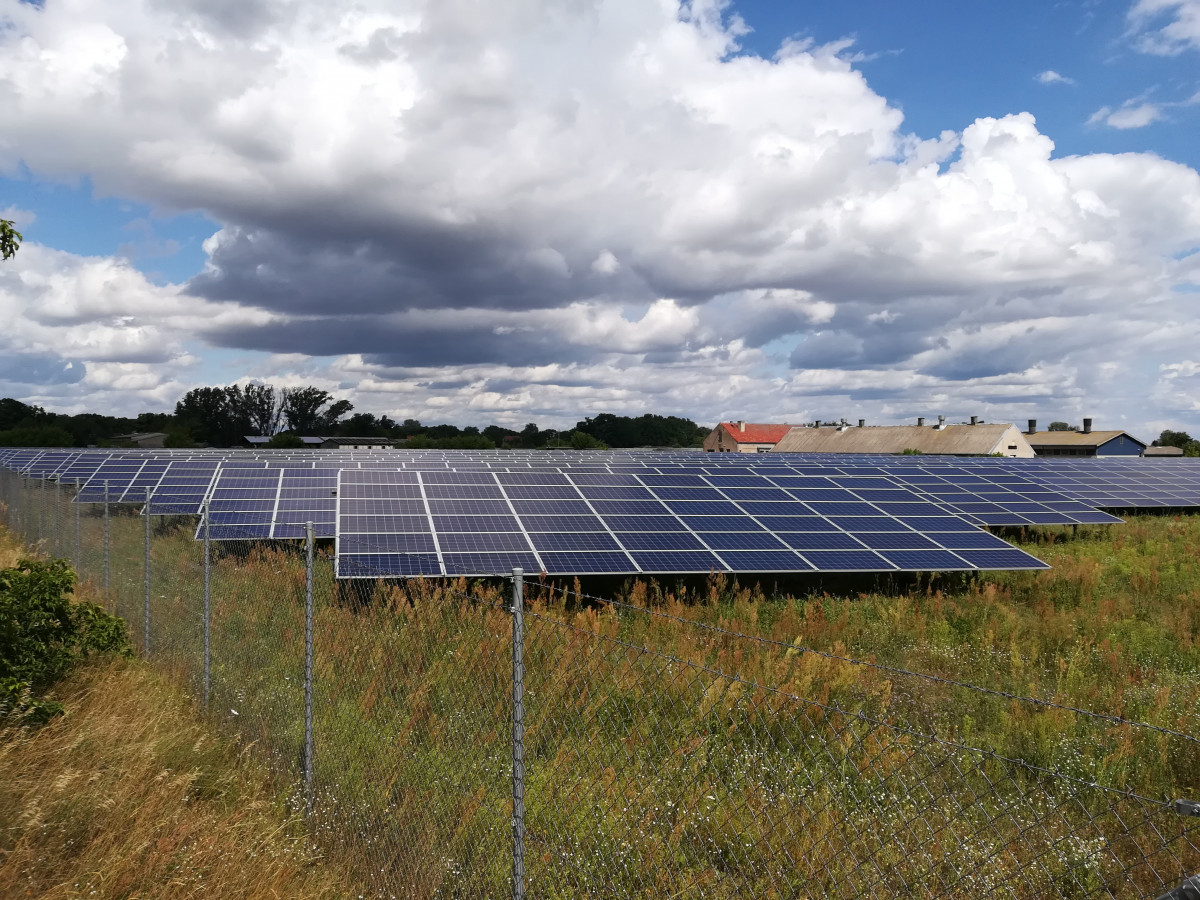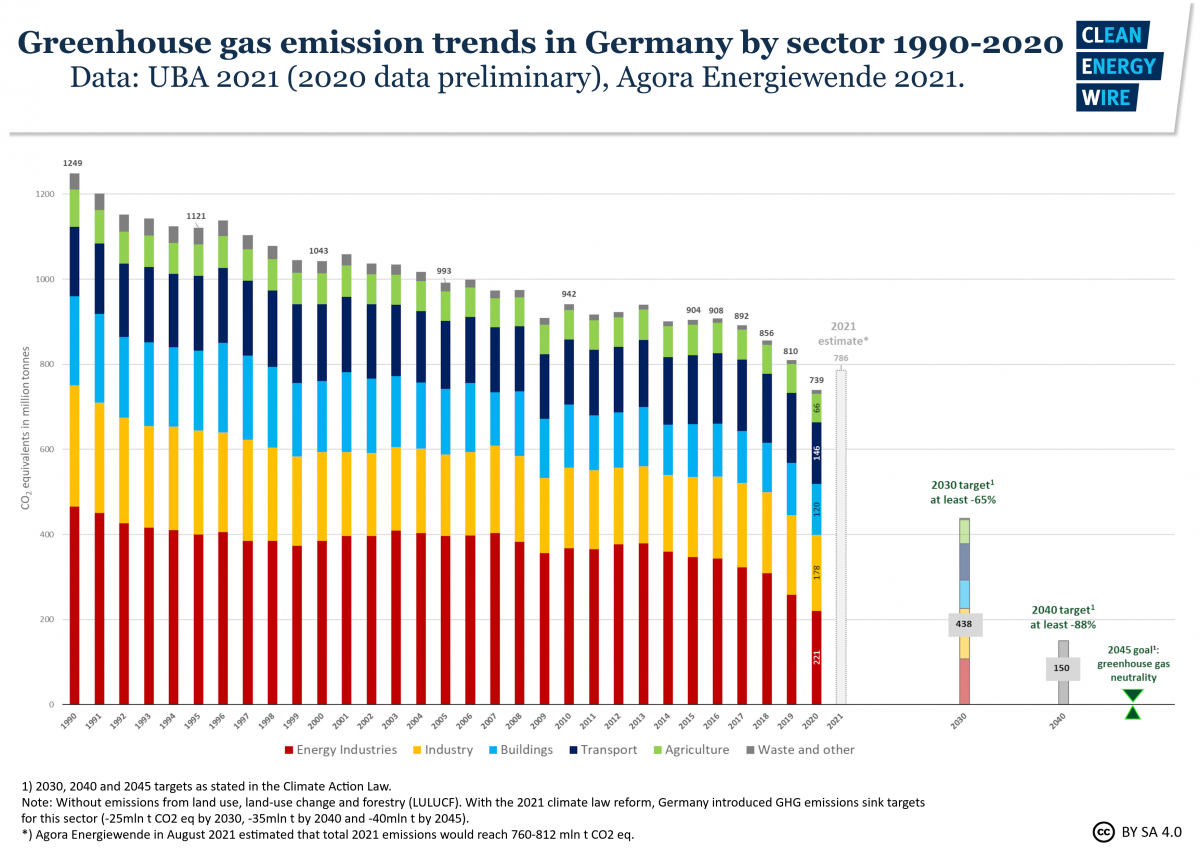Germany to widely miss 2030 climate target – draft govt report
Germany is set to widely miss its new target of reducing greenhouse gas emissions by 65 percent by 2030, show projections in a draft environment ministry report. Without further action, total greenhouse gas emissions (excluding land use, land use change and forestry) will decrease by only 49 percent between 1990 and 2030, and by 67 percent by 2040 (target: 88%), the draft of the 2021 Projection Report, as seen by Clean Energy Wire, says.
The report, which is authored by several research institutes including Öko-Institut and Fraunhofer ISI, cautions that estimates of emissions development are subject to “considerable uncertainties”, and the environment ministry also stressed that they do not yet take into account key government action decided in recent months. Still, the significant gap between the estimate and climate targets was quickly criticised by opposition parties and researchers.
The report’s figures show once again that the governing coalition of conservative CDU/CSU and Social Democrats (SPD) “leaves the next government a shambles when it comes to climate action,” said Green Party parliamentary group head Anton Hofreiter.
Reports and calculations of future emissions reduction have time and again shown that Germany must do more to reach targets. Earlier this week, think tank Agora Energiewende forecast that Germany's greenhouse gas emissions will increase by around six percent in 2021 as the economy rebounds from the effects of the coronavirus pandemic. Six weeks before the country's general elections on 26 September, both reports sharpen the climate focus in the campaigns. Parties will be expected to lay out proposals on how they aim to close the gap between projections and targets.
Since climate action climbed to the top of voter concerns following heatwaves, drought and the rise of the Fridays for Future student climate movement in 2018/2019, the government has introduced new legislation and programmes, such as the Climate Action Law and the Climate Action Programme 2030. Then, following a landmark climate ruling by the Constitutional Court in April this year, the cabinet and then parliament pulled forward the country’s target for climate-neutrality to 2045 and tightened the 2030 target to -65 percent. This was also done in response to the decision by the European Union to increase the bloc’s 2030 climate target to at least 55 percent by 2030, meaning all member states must do more.
Env min considers report "outdated" but researchers warn not even old target would be reached
The report is only of “very limited value”, said the environment ministry in reaction to a first media report by business daily Handelsblatt. The projections report takes into account only the measures decided by August 2020. “Since then, so much has happened in terms of climate action that the projection report can be considered outdated with a view to 2030,” said the ministry in a statement. The “rapidly rising” allowance price in the EU Emissions Trading System (EU ETS), the recovering economy after the coronavirus crisis and the upcoming legislative reforms (“Fit for 55 package”) at the EU level had not yet been taken into account. In addition, the German government decided on a ‘climate pact’ to step up action when it set more ambitious climate targets in May, the ministry argued.
"So much has happened in terms of climate action that the projection report can be considered outdated with a view to 2030."
The Projection Report is required by the European Union every two years and shows how greenhouse gas emissions will develop over the coming 20 years. It was originally slated for publication in early 2021 and is currently being reviewed within the government and a final version will be published soon, said the ministry.
The arguments by the ministry are not convincing, Brigitte Knopf, secretary general of the Mercator Research Institute on Global Commons and Climate Change (MCC) and member of Germany’s Expert Council on Climate Change, wrote in a message on Twitter. “Not even the old target of -55 percent is reached,” she said. “I doubt that the climate pact manages to make up for this,” she said, adding that on top of this comes the new increased target.
"Not even the old target of -55 percent is reached. I doubt that the climate pact manages to make up for this."
Germany’s Climate Action Law sets out annual greenhouse gas reduction targets for each economic sector. In case of a target miss, the relevant ministry has to quickly propose an emergency programme. This happened for the first time this year, as the buildings sector missed its 2020 target. The proposals by the ministry for the interior are likely to be insufficient, said the Council of Experts on Climate Change.
Germany misses target by wide margin even with ETS allowance price of 61 euros by 2030
The projections report assumes that 8.4 million electric cars will be registered in Germany by 2030. The installed onshore wind power capacity will have increased from currently around 54 gigawatts to 71 gigawatts by then, and the installed solar PV capacity from 53 gigawatts to 100 gigawatts. This also corresponds to the expansion targets currently set by the German government for 2030. The coalition government has not set higher expansion targets for renewable energies beyond 2022, despite stricter climate targets. The next government will need to find an agreement. The report also assumes that the national CO2 price on transport and heating fuels will be 125 euros in 2030 and will rise to 275 euros per tonne of CO2 emitted by 2040. Currently, the price is 25 euros per tonne.
The calculations for arriving at 49 percent emissions reduction assume a moderate CO2 price in the European emissions trading system of 30 euros per tonne by 2030. The report cautions that the allowance price “has risen much faster than expected at the time the framework data was agreed” because EU member states have since decided a more ambitious climate target for 2030.
However, according to the report, even with “significantly higher” prices in the ETS of 61 euros by 2030, German emissions only decrease by 51 percent overall.
“Germany is far from achieving the annual reductions of around 35 million tonnes of CO2 required by the Climate Action Law,” said Agora Energiewende, according to a report by Tagesspiegel Background. The new climate targets can only be achieved if action is taken right at the beginning of the next legislative period, it said. The think tank aims to present a package of proposals for a government programme for the first 100 days in office next week, writes Tagesspiegel.
Environmental organisations called on the candidates for chancellor in the national election to present proposals on how to close the gap. Christoph Bals, policy director at NGO Germanwatch, said that if the next government does not present a “massive climate action emergency programme”, it will lose the possibility to reach climate targets and will “endanger the freedom and health of today's young people.”



